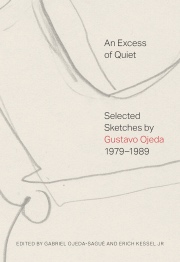Cuban American painter Gustavo Ojeda (1958–89) is best known for lush and meditative urban nightscapes, which brought him recognition in the 1980s downtown New York art scene. He exhibited alongside artists including Jean-Michel Basquiat, Keith Haring, and David Wojnarowicz before dying from AIDS-related complications in 1989, just two weeks shy of his thirty-first birthday. Ojeda’s paintings were notably unpopulated, but in his private sketchbooks, he fixated on the people of New York, filling thousands of pages with disembodied faces and the bodies of sleeping people riding public transportation and moving within urban space.
An Excess of Quiet: Selected Sketches by Gustavo Ojeda, 1979–1989 presents a selection of over 200 sketches that demonstrate the artist’s rigorous commitment to his craft. In the context of loss, both archival and intimate, that accompanied the height of the AIDS crisis, this book is meant to serve as a recuperative introduction to Ojeda’s oeuvre through material that has never before been shared publicly. In the margins of his sketchbooks, Ojeda often wrote that he felt anxious about his productivity, shaming himself for not being able to paint more before his death. This book answers Ojeda’s worries with the recovery of what was always right in front of him, his most obsessive and tender practice.

